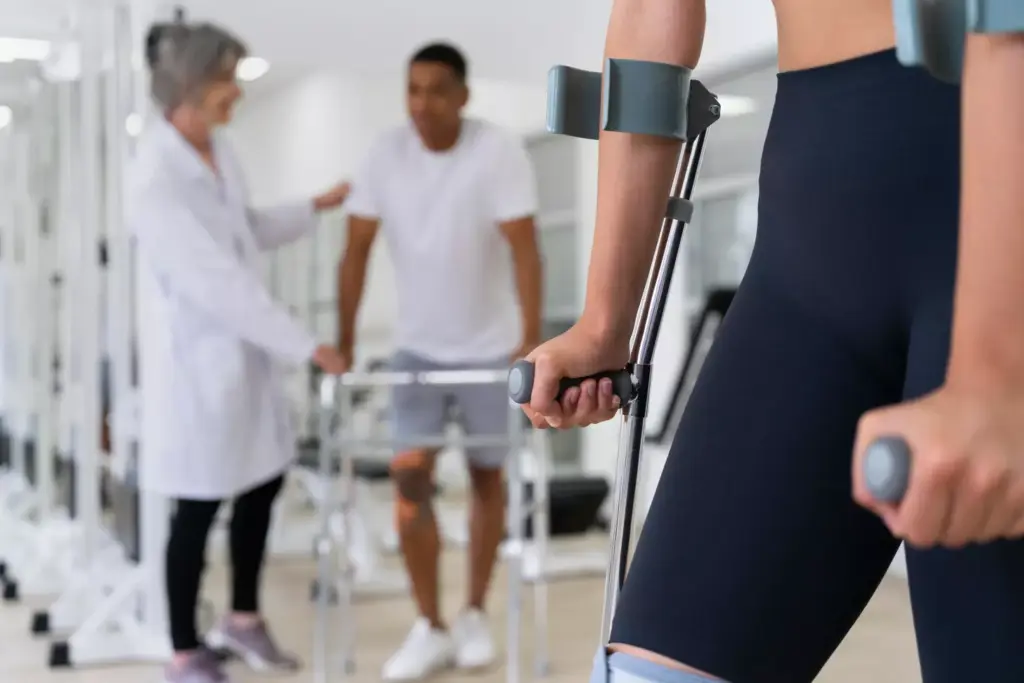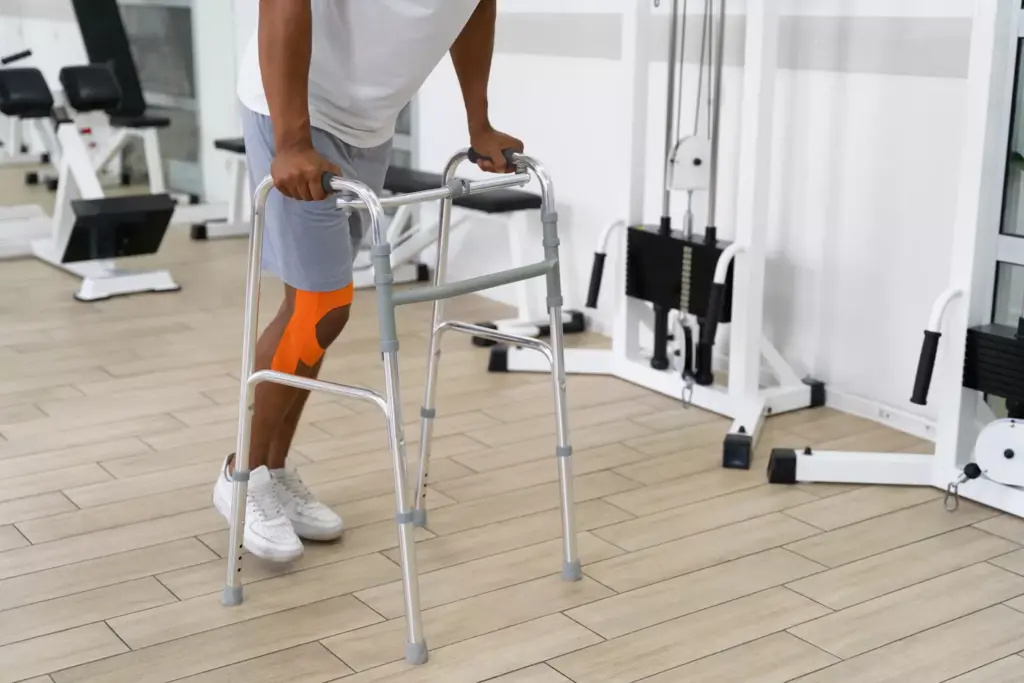
After hip replacement surgery, getting back on your feet is key. At Liv Hospital, we know how important the right walker is. It helps with stability, lowers fall risks, and speeds up getting back to normal.
We take a full approach to hip replacement recovery. This includes the right tools and care just for you. Our rehab plans are designed to keep you safe and help you heal effectively, regardless of your needs or weight.
Key Takeaways
- Choosing the right walker is key for stability and recovery after hip replacement surgery.
- Liv Hospital’s rehab is tailored to each patient’s needs.
- A good walker can greatly lower fall risks and boost mobility.
- Our team is all in on giving you the best care.
- We have advanced rehab plans to help with full recovery.
The Critical Role of Walkers in Hip Replacement Recovery

Walkers are key for those recovering from hip replacement surgery. They offer the support and stability needed. The recovery process can be tough, and the right mobility aid is vital for getting back on your feet.
Benefits for Stability, Balance, and Fall Prevention
Using a walker after hip replacement surgery boosts stability. This extra support greatly lowers the risk of falls. Fall prevention is critical because falls can cause more harm, slow down recovery, and lead to injuries.
Walkers also help keep patients balanced, making it safer to move around. This is very important in the early stages of recovery. At this time, patients are getting used to new challenges and limitations.
How Long Do You Need a Walker After Hip Replacement?
The time needed to use a walker after hip replacement surgery varies. Most people use a walker for the first few weeks. But, how long depends on health, mobility, and strength.
Studies show that rollator walkers, with four wheels and hand brakes, are best. They help patients move more easily and safely, reducing fall risks.
To understand better how long you might need a walker, look at this table:
| Factor | Influence on Walker Use Duration |
|---|---|
| Patient’s Overall Health | Patients with better overall health tend to require walkers for a shorter duration. |
| Pre-Surgery Mobility | Higher pre-surgery mobility levels can result in shorter walker use. |
| Type of Walker Used | Rollator walkers with four wheels and hand brakes can facilitate earlier mobility and potentially shorter walker use. |
Finding the Best Walker for Hip Replacement Surgery: Key Features to Consider

Choosing the right walker is key to a smooth recovery after hip replacement surgery. The right walker can greatly help your rehabilitation. It provides the support and stability you need.
Weight Capacity and Stability Requirements
When picking a walker, think about its weight capacity and stability. A walker that supports your weight is essential for safety. If you weigh 350 pounds or more, a heavy-duty walker is best.
Key considerations for weight capacity and stability include:
- Make sure the walker can handle your weight
- Choose walkers with a wide base for better stability
- Look for walkers with adjustable legs for uneven surfaces
| Walker Type | Weight Capacity | Stability Features |
|---|---|---|
| Standard Walker | 250-300 lbs | Basic frame design |
| Heavy-Duty Walker | 350-500 lbs | Reinforced frame, wider base |
| Bariatric Walker | 500+ lbs | Extra-wide base, heavy-duty construction |
Adjustability and Ergonomic Design
An adjustable and ergonomic walker can make your recovery more comfortable. Features like adjustable handles and ergonomic grips help reduce body strain.
When evaluating adjustability and ergonomic design, consider:
- Walkers with adjustable handle heights to fit your stature
- Ergonomic grip designs that reduce hand and wrist strain
- Padded or contoured handles for added comfort
Special Considerations for Hip Replacement at 350 Pounds or More
For those weighing 350 pounds or more, a special walker is needed. Heavy-duty or bariatric walkers are made for higher weights. They have reinforced materials and wider bases for support and stability.
For individuals requiring a walker for hip replacement at 350 pounds or more, we recommend:
- Heavy-duty walkers with weight capacities of 350-500 lbs
- Bariatric walkers for even higher weight capacities
- Consulting with healthcare professionals to determine the best walker for your specific needs
Types of Walkers for Post-Hip Replacement Mobility
Choosing the right walker is key to a smooth recovery after hip replacement surgery. The right aid gives the support and stability needed. It helps patients move around with confidence.
Standard Walkers vs. Rollator Walkers
There are mainly two walkers for hip replacement recovery: standard walkers and rollator walkers. Standard walkers are very stable but need you to lift them with each step. Rollator walkers, with their wheels, move smoothly without lifting.
Rollator walkers are great for those who need to go further or move more. They often have hand brakes and storage, making them very useful.
Two-Wheeled vs. Four-Wheeled Options
Rollator walkers come in two-wheeled and four-wheeled models. Two-wheeled walkers balance stability and mobility, needing some effort. Four-wheeled walkers offer easy mobility, perfect for those with big mobility issues.
| Walker Type | Key Features | Benefits |
|---|---|---|
| Standard Walker | Maximum stability, no wheels | Ideal for patients needing high support, promotes balance |
| Rollator Walker (Two-Wheeled) | Wheels on front legs, hand brakes | Balances stability and mobility, suitable for longer distances |
| Rollator Walker (Four-Wheeled) | Four wheels, hand brakes, often with seat | Maximum mobility, minimal effort required, ideal for severe mobility issues |
Studies show that four-wheeled rollator walkers with hand brakes are best for hip replacement recovery. Knowing the different walkers helps patients and caregivers choose the best one for recovery.
Drive Medical Four Wheel Walker Rollator
The Drive Medical Four Wheel Walker Rollator is great for those recovering from surgery. It offers stability, comfort, and mobility. It helps users stay independent while getting the support they need.
Product Overview
The Drive Medical Four Wheel Walker Rollator is easy to assemble and intuitive to use. It’s perfect for those who need help with moving around. It has a firm seat and padded backrest for comfort during breaks.
It’s designed to be a reliable aid during recovery. This product meets the needs of those who need mobility help.
Some key features of the Drive Medical Four Wheel Walker Rollator include:
- Four-wheel design for enhanced stability and maneuverability
- Padded backrest and seat for comfort
- Adjustable height to accommodate different user needs
- Storage pouch for personal items
For more information on Drive Medical’s range of mobility walkers and rollators, you can visit their official page at Drive Medical Mobility Walkers. This resource provides a detailed overview of their products. It can help you make an informed decision about your mobility needs.
Medline Heavy Duty Bariat Walker
The Medline Heavy Duty Bariatric Rollator Walker is made for those who need extra support. It’s great for people who have had hip replacement surgery. They need help getting around while they heal.
Product Overview
This walker has features that are perfect for heavy users. It includes:
- High Weight Capacity: It supports users who are heavier, keeping them safe and stable.
- Durable Construction: It’s built to last, with heavy-duty materials.
- Adjustable Height: It can be adjusted to fit the user’s height, for comfort.
- Comfortable Seating: It has a padded seat for resting.
- Easy Maneuverability: Its wheels move smoothly, making it easy to use.
This walker is designed to meet the needs of those recovering. It offers the support and stability needed during healing. It’s a great tool for those recovering from hip replacement surgery.
Using this walker has many benefits. It includes:
- It makes users more stable, lowering the chance of falls.
- It’s comfortable, thanks to adjustable features and a padded seat.
- It’s built to last, even with heavy use.
Choosing the Medline Heavy Duty Bariatric Rollator Walker helps patients recover better. They get a reliable aid for their mobility.
Hugo Mobility Elite Rollator Walker
The Hugo Mobility Elite Rollator Walker is a top pick for those recovering from hip replacement. It’s built to be strong and reliable, helping you move around safely and easily.
Product Overview
This walker is made for those recovering from hip surgery. It’s sturdy and has features that help with balance and support. It’s perfect for those needing extra help while they heal.
Key Features:
- High-quality, durable construction
- Advanced braking system for added safety
- Comfortable, ergonomic handle design
- Spacious storage basket for personal items
Dr. Jane Smith, an orthopedic surgeon, says, “A good walker can really help with recovery. The Hugo Mobility Elite Rollator Walker is great because it’s stable and easy to use.”
“A good walker can make a significant difference in a patient’s recovery process. The Hugo Mobility Elite Rollator Walker is an excellent option due to its stability and ease of use.” – Dr. Jane Smith, Orthopedic Surgeon
Let’s compare the Hugo Mobility Elite Rollator Walker with other popular models:
| Feature | Hugo Mobility Elite | Drive Medical Four Wheel | Medline Heavy Duty |
|---|---|---|---|
| Weight Capacity | 300 lbs | 300 lbs | 500 lbs |
| Wheels | 4 | 4 | 2 |
| Braking System | Advanced Loop Lock | Loop Lock | Push Down Brakes |
The Hugo Mobility Elite Rollator Walker is known for its advanced braking and comfortable handle. It’s a favorite among patients and healthcare workers.
Vive Folding Walker
Patients getting hip replacement surgery often need a walker for support. The Vive Folding Walker is a great choice. It’s both sturdy and easy to carry around.
Product Overview
The Vive Folding Walker focuses on comfort and ease. It has a light but strong frame. This makes it good for many users.
Key Features:
- Compact folding design for easy storage and transport
- Adjustable height settings to accommodate different user needs
- Ergonomic handle design for reduced strain on the hands and wrists
- Durable construction to ensure long-term reliability
As a review points out,
“The Vive Folding Walker has been a game-changer for my patients. It’s easy to use and transport, making it an excellent choice for those recovering from hip replacement surgery.”
The Vive Folding Walker is known for its ease of use and portability. It’s perfect for patients needing a mobility aid that’s easy to take with them.
NOVA Medical Products Traveler 3-Wheel Rollator Walker
The NOVA Medical Products Traveler 3-Wheel Rollator Walker is great for those who need both stability and easy movement. It’s perfect for people recovering from hip replacement surgery. A good mobility aid is key during this time.
Key Features and Benefits
This walker has a lightweight aluminum frame for easy use. Its 3-wheel design helps you move smoothly in small spaces. It’s great for indoor use.
The walker’s adjustable height fits users of all heights. It also has a padded seat and a storage pouch under the seat. These features add comfort and convenience.
| Feature | NOVA Traveler 3-Wheel Rollator | Standard 4-Wheel Rollator |
|---|---|---|
| Weight | 15 lbs | 20 lbs |
| Foldability | Yes | Yes |
| Adjustable Height | Yes | Yes |
| Wheels | 3 | 4 |
The NOVA Medical Products Traveler 3-Wheel Rollator Walker is versatile. It’s both compact and supportive. It’s a top pick for those recovering from hip replacement surgery.
Conclusion: Making the Right Choice for Your Recovery Journey
Choosing the right walker for hip replacement recovery is key. It greatly affects your healing. We looked at several walkers, like the Drive Medical Four Wheel Walker Rollator and the Medline Heavy Duty Bariat Walker. Each has its own special features and benefits.
At Liv Hospital, we know picking the right walker is vital for a safe recovery. We aim to give top-notch healthcare and support to our international patients. Think about the walker’s weight capacity, stability, adjustability, and design. This will help you find the perfect walker for your recovery.
Choosing the best walker is more than just moving around. It’s about getting your independence and confidence back. We suggest looking into these walkers more and talking to doctors to find the best one for you.
FAQ
How long do I need to use a walker after hip replacement surgery?
The time you’ll need a walker varies. It usually lasts from a few weeks to a few months. Always listen to your doctor for the best recovery plan.
What are the key features to consider when choosing a walker for hip replacement recovery?
Look for a walker that can hold your weight, is stable, adjustable, and comfortable. If you weigh over 350 pounds, find a walker that’s sturdy and stable.
What type of walker is best suited for post-hip replacement mobility?
The right walker depends on what you need. Rollator walkers are good for their stability and ease. Standard walkers offer extra support if needed.
Are there walkers designed for patients with higher weight requirements?
Yes, there are walkers for heavier patients, like bariatric walkers. They can hold more weight and are built strong for support and stability.
Can I use a walker with wheels on uneven surfaces?
Walkers with wheels are okay on different surfaces, but be careful on uneven ground. Choose a walker with wide bases or anti-tip wheels to stay safe.
How do I adjust my walker to fit my height and comfort needs?
Most walkers can be adjusted to fit you. Check with your doctor or the maker’s guide to adjust it for comfort and support.
How long do I need to use a walker after hip replacement surgery?
The time you’ll need a walker varies. It usually lasts from a few weeks to a few months. Always listen to your doctor for the best recovery plan.
What are the key features to consider when choosing a walker for hip replacement recovery?
Look for a walker that can hold your weight, is stable, adjustable, and comfortable. If you weigh over 350 pounds, find a walker that’s sturdy and stable.
What type of walker is best suited for post-hip replacement mobility?
The right walker depends on what you need. Rollator walkers are good for their stability and ease. Standard walkers offer extra support if needed.
Are there walkers designed for patients with higher weight requirements?
Yes, there are walkers for heavier patients, like bariatric walkers. They can hold more weight and are built strong for support and stability.
Can I use a walker with wheels on uneven surfaces?
Walkers with wheels are okay on different surfaces, but be careful on uneven ground. Choose a walker with wide bases or anti-tip wheels to stay safe.
How do I adjust my walker to fit my height and comfort needs?
Most walkers can be adjusted to fit you. Check with your doctor or the maker’s guide to adjust it for comfort and support.
References
- UMass Memorial Health. (n.d.). After Hip Replacement: Using Your Walker (Healthsheet S 90062). Retrieved October 16, 2025, from https://myhealth.umassmemorial.org/Library/Healthsheets/3%2CS%2C90062 myhealth.umassmemorial.org
- Elenker Walker. (2025, April 09). How a Rollator Walker Helps After a Hip or Knee Replacement. Retrieved October 16, 2025, from https://www.elenkerwalker.com/blogs/rollator-walkers/how-a-rollator-walker-helps-after-a-hip-or-knee-replacement Elenker
- Johns Hopkins Medicine. (n.d.). Hip Replacement Surgery. Retrieved October 16, 2025, from https://www.hopkinsmedicine.org/health/treatment-tests-and-therapies/hip-replacement-surgery Hopkins Medicine
- Varacallo, M. (2023). Total Hip Arthroplasty Techniques. In StatPearls. Retrieved October 16, 2025, from https://www.ncbi.nlm.nih.gov/books/NBK507864/ NCBI
- Hospital for Special Surgery (HSS). (2024, July 8). Hip Replacement Surgery: How it Works, Recovery Time. Retrieved October 16, 2025, from https://www.hss.edu/health-library/conditions-and-treatments/list/hip-replacement hss.edu





